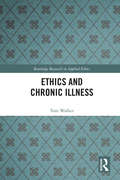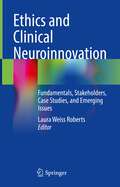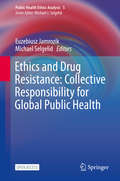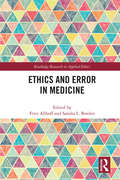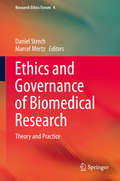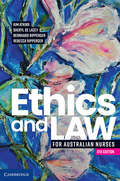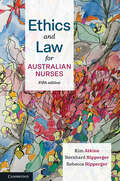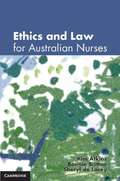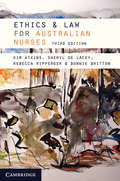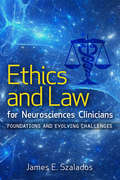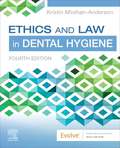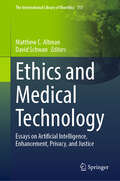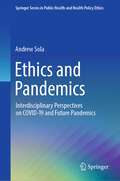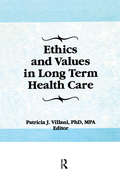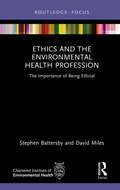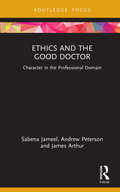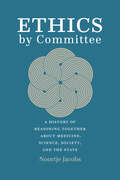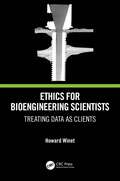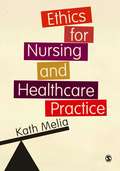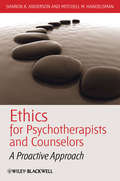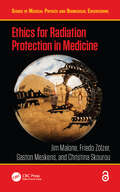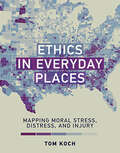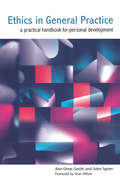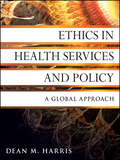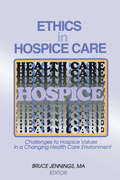- Table View
- List View
Ethics and Chronic Illness (Routledge Research in Applied Ethics)
by Tom WalkerThis book provides an account of the ethics of chronic illness. Chronic illness differs from other illnesses in that it is often incurable, patients can live with it for many years, and its day-to-day management is typically carried out by the patient or members of their family. These features problematise key distinctions that underlie much existing work in medical ethics including those between beneficence and autonomy, between treatment and prevention, and between the recipient and provider of treatment. The author carries out a detailed reappraisal of the roles of both autonomy and beneficence across the different stages of treatment for a range of chronic illnesses. A central part of the author’s argument is that in the treatment of chronic illness, the patient and/or the patient’s family should be seen as acting with healthcare professionals to achieve a common aim. This aspect opens up unexplored questions such as what healthcare professionals should do when patients are managing their illness poorly, the ethical implications of patients being responsible for parts of their treatment, and how to navigate sharing information with those directly involved in patient care without violating privacy or breaching confidentiality. The author addresses these challenges by engaging with philosophical work on shared commitments and joint action, responsibility and justice, and privacy and confidentiality. The Ethics of Chronic Illness provides a new, and much needed, critical reappraisal of healthcare professionals’ obligations to their patients. It will be of interests to academics working in bioethics and medical ethics, philosophers interested in the topics of autonomy, responsibility, and consent, and medical practitioners who treat patients with chronic illness.
Ethics and Clinical Neuroinnovation: Fundamentals, Stakeholders, Case Studies, and Emerging Issues
by Laura Weiss RobertsNew ways of understanding the brain – its nature, its capacities, its function, and its dysfunction – hold great promise for human wellbeing. Novel therapeutics spurred by this understanding have important roles addressing many clinical conditions, including Alzheimer Disease, depression, addiction, and obsessive-compulsive disorder. This unique title explores a wide range of groundbreaking sciences and clinical practices for brain-based conditions, including deep brain stimulation, optogenetics, technology-delivered therapies, predictive testing, and new clinical uses of ketamine, cannabis, and other psychoactive substances.An introduction to the imperative to develop new treatments for devastating brain disorders and the state of current therapeutics in psychiatry, addiction, and behavioral disorders is presented, and chapters from leading physician-scientists and neuroethicists outline the clinical and the ethical issues arising in innovation and in the creation of new therapeutics for brain diseases. Written by renowned thought leaders in their fields, the book presents tightly written contributions on novel qualitative and quantitative data from stakeholders in the field, including neuroscientist-clinicians, people living with mental illness and/or addictions, and oversight/policy stakeholders. Concise, anticipatory, and centered on the principles governing human biomedical research and innovation in developing novel therapeutics for brain disorders, Ethics and Clinical Neuroinnovation will be of great value to clinicians, researchers, and students from a vast array of backgrounds, including neuroethics, neuroscience, psychology, psychiatry, philosophy, entrepreneurship, and the law.
Ethics and Drug Resistance: Collective Responsibility for Global Public Health (Public Health Ethics Analysis #5)
by Euzebiusz Jamrozik Michael SelgelidThis Open Access volume provides in-depth analysis of the wide range of ethical issues associated with drug-resistant infectious diseases. Antimicrobial resistance (AMR) is widely recognized to be one of the greatest threats to global public health in coming decades; and it has thus become a major topic of discussion among leading bioethicists and scholars from related disciplines including economics, epidemiology, law, and political theory. Topics covered in this volume include responsible use of antimicrobials; control of multi-resistant hospital-acquired infections; privacy and data collection; antibiotic use in childhood and at the end of life; agricultural and veterinary sources of resistance; resistant HIV, tuberculosis, and malaria; mandatory treatment; and trade-offs between current and future generations. As the first book focused on ethical issues associated with drug resistance, it makes a timely contribution to debates regarding practice and policy that are of crucial importance to global public health in the 21st century.
Ethics and Error in Medicine (Routledge Research in Applied Ethics)
by Fritz Allhoff Sandra L. BordenThis book is a collection of original, interdisciplinary essays on the topic of medical error. Given the complexities of understanding, preventing, and responding to medical error in ethically responsible ways, the scope of the book is fairly broad. The contributors include top scholars and practitioners working in bioethics, communication, law, medicine and philosophy. Their contributions examine preventable causes of medical error, disproportionate impacts of errors on vulnerable populations, disclosure and apology after discovering medical errors, and ethical issues arising in specific medical contexts, such as radiation oncology, psychopathy, and palliative care. They also offer practical recommendations for respecting autonomy, distributing burdens and benefits justly, and minimizing injury to patients and other stakeholders. Ethics and Error in Medicine will be of interest to a wide range of researchers, students, and practitioners in bioethics, philosophy, communication studies, law, and medicine who are interested in the ethics of medical error.
Ethics and Governance of Biomedical Research
by Daniel Strech Marcel MertzIn this book,scholars with different disciplinary and national backgrounds argue forpossible answers and analyse case studies on current issues of governance inbiomedical research. These issues comprise among others the research-caredistinction, risk evaluation in early human trials, handling of incidentalfindings, nocebo effects, cluster randomized trials, publication bias, orconsent in biobank research. This book demonstrates how new technologies andresearch possibilities multiply or intensify already known governancechallenges, leaving room for ethical analysis and complex moral choices. Clinical researchers, research ethics committee members and research ethicistshave all to deal with such challenges on a daily basis. While generalreflection on core concepts of research ethics is seldom pointless, thoseconfronted with hard moral choices do need more practical and contextualizedreflection on the said issues. This book particularly provides suchcontextualized reflections and aims to inform all those who study, conduct,regulate, fund, or participate in biomedical research.
Ethics and Law for Australian Nurses
by Kim Atkins Rebecca Ripperger Sheryl de Lacey Bernhard RippergerA sound understanding of moral and legal obligations is critical to developing responsible nursing practice and building the nurse-patient relationship. Ethics and Law for Australian Nurses provides a practical framework for understanding the ethical and legal dimensions of nursing practice. The fourth edition has been thoroughly revised to include updates to legislation, the NMBA professional standards and case examples. A new chapter on the legal system and a fully revised chapter on duty of care and negligence provide a thorough overview of the law as it applies to nursing practice. The text also includes expanded material on the regulation of nursing practice, advanced care directives, cultural safety, practice in the context of digital environments, person-centred care and assisted dying. Written in an accessible and engaging style, Ethics and Law for Australian Nursing provides a comprehensive guide for nurses training and practising in clinical, research and policy settings.
Ethics and Law for Australian Nurses
by Kim Atkins Sheryl De Lacey Bonnie BrittonNursing is a profession that encompasses a huge diversity of practices and practice settings, but the aim of nursing practice remains the same: to support and promote the health and well-being of human persons. Ethics and Law for Australian Nurses is an integrated and coherent textbook that allows students to understand the mutual relationship between the legal and ethical frameworks of nursing practice. The text considers two key concepts to understanding the relation of ethics and law to the practice of nursing: the idea of human vulnerability and respect for persons. Through understanding ethics and law in terms of vulnerability and respect, this text provides a fresh understanding of the ethical and legal aspects of committing and witnessing errors in nursing practice. Many varied case studies and practical examples are used throughout to aid students' understanding of the ethical and legal responsibilities of nurses.
Ethics and Law for Australian Nurses
by Kim Atkins Bonnie Britton De Lacey Sheryl Rebecca RippergerThe third edition of Ethics and Law for Australian Nurses develops an innovative practical framework for understanding the ethical and legal dimensions of nursing practice in Australia. Taking a 'relational' approach to practice, the text foregrounds the concepts of personhood, vulnerability and the nurse-patient relationship as the source of a nurse's moral and legal obligations. This approach is central to the book's discussion of key ethical and legal concepts throughout the text including consent and autonomy, negligence and liability, confidentiality and trust, and culturally safe practice. This edition has been thoroughly revised to include the latest research and methods, updated legislation and links to professional documentation, along with a new chapter on aged care. Student learning is supported by case studies, legal case extracts and learning exercises. A new instructor companion website features a curated suite of multimedia resources and extension questions.
Ethics and Law for Neurosciences Clinicians: Foundations and Evolving Challenges (Clinical Neurology Best Practices)
by James E SzaladosThe brain represents the final frontier in medical sciences. Clinical neurosciences include the subspecialties of neurology, neurosurgery, neuro-imaging, cerebrovascular interventional specialties, neurocritical care, and the allied specialties in pharmacy and nursing. The first lens through which we see our patients is the clinical perspective; however, the complexity of neurosciences and the rapidity of the advances in these subspecialties require that clinicians not lose sight of the personhood of the patients, the professionalism required in the care of these complex patients, or the regulatory environment in which we practice. Science and technology are advancing more rapidly than regulations or the law can interpret and integrate them into a supportive or regulatory framework. Thus, morality, ethics, and the law comprise the final lens through which we approach complex patient management issues, frame our communications with patients and families, and evaluate the risks and potential benefits of new technology. Ethics and Law for Neurosciences Clinicians is written for all clinicians in the neurosciences specialties to examine and re-examine the ethical and legal implications of advances in clinical neurosciences.
Ethics and Law in Dental Hygiene
by Kristin Minihan-AndersonLearn professional, practical ways to handle ethical and legal issues in dental practice! Ethics and Law in Dental Hygiene, 4th Edition provides a solid foundation in ethical theory and laws relating to oral healthcare professionals, including ethical conduct and social responsibility. An ethical decision-making model helps you unpack and analyze ethical dilemmas, and case scenarios challenge you to apply concepts to the real world. Written by a team of experts led by educator Kristin Minihan-Anderson, this book helps Dental Hygiene students prepare for the NBDHE exam and also serves as an valuable reference for practitioners looking to continue their professional growth.
Ethics and Medical Technology: Essays on Artificial Intelligence, Enhancement, Privacy, and Justice (The International Library of Bioethics #113)
by Matthew C. Altman David SchwanThis book provides a comprehensive survey of ethical issues raised by advanced medicaltechnologies. The field&’s leading authorities explore how artificial intelligence, telehealth,robot caregivers, genetic therapies and enhancement, stem cell research,neurotechnology, electronic health records, data collection, and digital nudging arereshaping the landscape of medical practice. Organized around core ethical themes, thechapters consider how new and emerging technologies transform personal identity, the provider-patient relationship, privacy and autonomy, and social equity. Contributors clarifythe complex values involved in medical innovation and practice, and explore what is atstake in the current ethical debates around these issues. While offering a valuableintroduction for advanced students, professional philosophers, medical ethicists, andpolicymakers, this book also advances the scholarly discussion by presenting originaltheses and arguments, making it essential reading for specialists.
Ethics and Pandemics: Interdisciplinary Perspectives on COVID-19 and Future Pandemics (Springer Series in Public Health and Health Policy Ethics)
by Andrew SolaThis book is for readers who wish to understand the ethical implications of the COVID-19 pandemic — holistically — on communities, politics, the economy, the environment, international relations, public health, and, most importantly, on their own lives and their own futures. It also helps readers to think through the wide-ranging ethical implications of the new age of global pandemics. The COVID-19 pandemic has transformed all of our lives to such an extent that no single publication will ever be able to capture its complexity. The book acknowledges this complexity by embracing interdisciplinary dialogue. It is open to diverse points of view, different ethical systems, and a wide variety of academic disciplines. It suggests three broad avenues to exploring the subject: Ethics for Pandemics: What ethical theories are useful for pandemic living?Ethics in Pandemics: How are long-standing ethical dilemmas revealed in pandemics? Ethics of Pandemics: How should politicians and public health professionals create ethical systems of pandemic management? Interdisciplinary perspectives are another key feature of the book and reflect the important insights that many academic disciplines — medical ethics and public health, history, political science, economics, behavioral and evolutionary psychology, and climate science — bring to bear on the subject. In the chapters, the author joins theory and practice, providing an overview of the major ethical theories: Kant and DeontologyUtilitarianism and Consequentialist EthicsSocial Contract TheoryEgoism and AltruismVirtue Ethics It then uses these theories to analyze both COVID-19 and also historical pandemics, including typhus, smallpox, the Black Death, HIV/AIDS, and polio. Ethics and Pandemics: Interdisciplinary Perspectives on COVID-19 and Future Pandemics prepares readers to better understand ethical living during times of crisis. While written for students pursuing any discipline, it is particularly suited for those seeking degrees in public health, health care, political science, and philosophy. Furthermore, non-specialized readers and members of the general public will find the book of interest.
Ethics and Values in Long Term Health Care
by Patricia VillaniHere is an overview of many of the ethical challenges facing health care practitioners today. Health providers striving for the appropriate balance between human rights and values and the objectives within their professions confront many ethical dilemmas. This helpful book explores such dilemmas from practical and philosophical perspectives and helps practitioners successfully navigate through the maze of concerns they face on a daily basis. With Ethics and Values in Long Term Health Care, readers can develop new modes of ethical thinking that will enhance their practice as they improve the quality of life of the elderly they serve. The book presents information that can be used as a catalyst for innovative thinking and a guide for positive action. Readers are encouraged to apply the lessons contained in this book to practical decisionmaking in their respective health professions. Chapters assist health practitioners and others in thinking more in-depth about the impact of their personal ethics and values on service delivery, and help them to broaden their views and enhance their decisionmaking skills. The book has a broad scope and is divided into four sections which address: Practitioner Knowledge Caregiving End of Life Choices Health Care ReformEthics and Values in Long Term Health Care helps prepare health care professionals to confront some of the major ethics and values challenges of the 1990s and beyond. This book can be used as a guide to ethical awareness, as well as a tool for teaching ethics and values or for developing programs and workshops.
Ethics and the Environmental Health Profession: The Importance of Being Ethical (Routledge Focus on Environmental Health)
by Stephen Battersby David MilesProviding an exploration of the discussion on how a stronger ethical basis for the work of environmental health practitioners (EHPs) can contribute to improved public health, because EHPs/environmental health officers (EHOs) come into daily contact with members of the public to address threats to their health and wellbeing. This book examines what is meant by professional ethics and the role of professional bodies in ensuring members of the profession act ethically. They should be expected to act as guardians of the public interest, without fear or favour. Ethics is an integral part of public health decision-making and needs to be incorporated into public and environmental health policy development and decision-making. This work, while seeking to stimulate debate within the environmental health profession, will examine what this means for EHPs.Ethics and the Environmental Health Profession: The Importance of Being Ethical explores the process of ethical decision-making in the environmental health profession and asks the question of whom EHPs have an ethical duty towards in their work. It looks at a variety of ethical issues which arise for EHPs working in local government, as consultants or for commercial companies.This book is useful for EHPs globally, other local government officers, educational establishments where environmental and public health courses are run globally, elected members of local authorities, and policymakers at national and local government levels.
Ethics and the Good Doctor: Character in the Professional Domain (Character and Virtue Within the Professions)
by Andrew Peterson James Arthur Sabena JameelEthics and the Good Doctor brings together existing literature and an analysis of empirical research conducted by the Jubilee Centre for Character and Virtues to examine the ethical nature of medical practice and explore medicine as a virtuous profession. The book is based on the idea that medical practice is an inherently moral profession, in which notions of trust, care and meaningful relationships form the foundations of being a good doctor. By taking into account the ethical dimensions of medical practice that have come under greater scrutiny and pressure over recent years, this book explores how personal and professional character is understood, enacted, and experienced by medical practitioners at various stages of their career. Ethics and the Good Doctor situates and presents the empirical data in a way that is accessible to practicing doctors, medical students, and medical educators. Clear implications for policy, practice, and research are offered, ensuring this book will be of great interest to a range of stakeholders involved in medical practice, including those working in medical policy.
Ethics by Committee: A History of Reasoning Together about Medicine, Science, Society, and the State
by Noortje JacobsHow liberal democracies in the late twentieth century have sought to resolve public concerns over charged issues in medicine and science. Ethics boards have become obligatory passage points in today’s medical science, and we forget how novel they really are. The use of humans in experiments is an age-old practice that records show goes back to at least the third century BC, and it has been popular as a practice since the early modern period. Yet in most countries around the world, hardly any formal checks and balances existed to govern the communal oversight of experiments involving human subjects until at least the 1960s. Ethics by Committee traces the rise of ethics boards for human experimentation in the second half of the twentieth century. Using the Netherlands as a case study, historian Noortje Jacobs shows how the authority of physicians to make decisions about clinical research in this period gave way in most developed nations to formal mechanisms of communal decision-making that served to regiment the behavior of individual researchers. This historically unprecedented change in scientific governance came out of the growing international wariness of medical research in the decades after World War II and was meant to solidify a new way of reasoning together in liberal democracies about medicine and science. But what reasoning together meant, and who was invited to participate, changed drastically over time. In detailing this history, Jacobs shows that research ethics committees were originally intended not only to make human experimentation more ethical but also to raise its epistemic quality and intensify the use of new clinical research methods. By examining complex negotiations over the appropriate governance of human subjects research, Ethics by Committee is an important contribution to our understanding of the randomized controlled trial and the history of research ethics and bioethics more generally.
Ethics for Bioengineering Scientists: Treating Data as Clients
by Howard WinetThis book introduces bioengineers and students who must generate and/or report scientific data to the ethical challenges they will face in preserving the integrity of their data. It provides the perspective of reaching ethical decisions via pathways that treat data as clients, to whom bioengineering scientists owe a responsibility that is an existential component of their professional identity. The initial chapters lay a historical, biological and philosophical foundation for ethics as a human activity, and data as a foundation of science. The middle chapters explore ethical challenges in lay, engineering, medical and bioengineering scientist settings. These chapters focus on microethics (individual behavior) and cases that showcase the consequences of violating data integrity. Macroethics (policy) is dealt with in the Enrichment sections at the end of the chapters, with essay problems and subjects for debates (in a classroom setting). The book can be used for individual study, using links in the Enrichment sections to access cases and media presentations like PBS’ "Ethics in America". The final chapters explore the impact of bioengineering science ethics on patients via medical product development, its regulation by the FDA, and the contribution of data integrity violation to product failure. The book was developed for advanced undergraduate and graduate students in bioengineering. It also contains much needed material that researchers and academics would find valuable (e.g., FDA survey and lab animal research justification). This book Introduces an approach to ethical decision-making based on treating data as clients Compares the ethics of three professions; engineering, medicine, and bioengineering Provides five moral theories to choose from for evaluating ethical decisions, and includes a procedure for applying them to moral analysis, and application of the procedure to example cases Examines core concepts, like autonomy, confidentiality, conflict of interest, and justice Explains the process of developing a medical product under FDA regulation Explores the role of lawyers and the judiciary in product development, including intellectual property protection Examines a range of ethical cases, from the historical Tuskegee autonomy case to the modern CRISPR-Cas9 patent case. Howard Winet, PhD is an Adjunct Professor recall, Orthopaedic Surgery and Bioengineering at University of California, Los Angeles.
Ethics for Nursing and Healthcare Practice
by Kath MeliaEveryday clinical practice is steeped in ethical considerations, but discussion of ethics is often removed from these real-life situations. Kath M Melia's new book works in the gap between theory and practice. The chapters tackle the main theories which form the discussion on ethics, and include practical case examples, which bring these theories into the clinical context. These classic and everyday cases challenge the reader to critically reflect on his/her own experiences and outlook. The social, legal and professional regulation context is brought into the discussion throughout, to equip students with the knowledge that they need to make clinical decisions. Topics covered include: - Beauchamp and Childress' four principles of bioethics - Rights - Personal and individual conscience - Moral philosophy - The virtues/virtue ethics of the practitioner. This book will be essential reading for pre-registration nursing students taking modules in ethics and law. It will also be a valuable text for postgraduates and qualified nurses, and students of health who need to gain an appreciation of ethics. www.sagepub.co.uk/melia
Ethics for Psychotherapists and Counselors: A Proactive Approach
by Sharon K. Anderson Mitchell M. HandelsmanEthics for Psychotherapists and Counselors utilizes positive discussions accompanied by a variety of thought-provoking exercises, case scenarios, and writing assignments to introduce readers to all the major ethical issues in psychotherapy. First book designed to engage students and psychotherapists in the process of developing a professional identity that integrates their personal values with the ethics and traditions of their discipline Authors take a positive and proactive approach that encourages readers to go beyond following the rules and to strive for ethical excellence Utilizes a variety of thought-provoking exercises, case scenarios, and writing assignments Authors present examples from their own backgrounds to help clarify the issues discussed Text emphasizes awareness of one’s own ethical, personal, and cultural backgrounds and how these apply to one’s clinical practice
Ethics for Radiation Protection in Medicine (Series in Medical Physics and Biomedical Engineering)
by Friedo Zölzer Gaston Meskens Jim Malone Christina SkourouThis book presents an up to date ethical framework for radiological protection in medicine. It is consistent with the requirements of the system of radiation protection and with the expectations of medical ethics. It presents an approach rooted in the medical tradition, and alert to contemporary social expectations. It provides readers with a practical framework against which they can assess the safety and acceptability of medical procedures, including patients’ concerns. It will be an invaluable reference for radiologists, radiation oncologists, regulators, medical physicists, technologists, other practitioners, as well as academics, researchers and students of radiation protection in medicine. Features: An authoritative and accessible guide, authored by a team who have contributed to defining the area internationally Includes numerous practical examples/clinical scenarios that illustrate the approach, presenting a pragmatic approach, rather than dwelling on philosophical theories Informed by the latest developments in the thinking of international organizations
Ethics in Everyday Places: Mapping Moral Stress, Distress, and Injury (Basic Bioethics)
by Tom KochAn exploration of moral stress, distress, and injuries inherent in modern society through the maps that pervade academic and public communications worlds.In Ethics in Everyday Places, ethicist and geographer Tom Koch considers what happens when, as he puts it, “you do everything right but know you've done something wrong." The resulting moral stress and injury, he argues, are pervasive in modern Western society. Koch makes his argument "from the ground up," from the perspective of average persons, and through a revealing series of maps in which issues of ethics and morality are embedded.The book begins with a general grounding in both moral stress and mapping as a means of investigation. The author then examines the ethical dilemmas of mapmakers and others in the popular media and the sciences, including graphic artists, journalists, researchers, and social scientists. Koch expands from the particular to the general, from mapmaker and journalist to the readers of maps and news. He explores the moral stress and injury in educational funding, poverty, and income inequality ("Why aren't we angry that one in eight fellow citizens lives in federally certified poverty?"), transportation modeling (seen in the iconic map of the London transit system and the hidden realities of exclusion), and U.S. graft organ transplantation.This uniquely interdisciplinary work rewrites our understanding of the nature of moral stress, distress and injury, and ethics in modern life. Written accessibly and engagingly, it transforms how we think of ethics—personal and professional—amid the often conflicting moral injunctions across modern society.Copublished with Esri Press
Ethics in General Practice: A Practical Handbook for Personal Development
by John Spicer Anne Orme-SmithA working understanding of medical ethics is becoming ever more important to all practising doctors. There are many ethical issues which present, often unexpectedly, to healthcare professionals which can seem impossible to resolve. This is an introductory text for everyday general practice. Key issues and relevant legal aspects are illustrated with examples and case histories, and the book is structured so particular topics can be found with ease. For added benefit, chapters have pointers for further reflection and analysis, references to journal articles and useful reading lists. The book can be used as a resource for group discussion or by individual general practitioners including GP registrars and their trainers.
Ethics in Health Services and Policy
by Dean M. HarrisThis comprehensive textbook analyzes the ethical issues of health and health care in global perspective. Ideal for students of public health, medicine, nursing and allied health professions, public policy, and ethics, the book helps students in all these areas to develop important competencies in their chosen fields. Applying a comparative, or multicultural, approach, the book compares different perspectives on ethical issues in various countries and cultures, such as informed consent, withholding or withdrawing treatment, physician-assisted suicide, reproductive health issues, research with human subjects, the right to health care, rationing of limited resources, and health system reform. Applying a transnational, or cross-border, approach, the book analyzes ethical issues that arise from the movement of patients and health professionals across national borders, such as medical tourism and transplant tourism, ethical obligations to provide care for undocumented aliens, and the "brain drain" of health professionals from developing countries. Comprehensive in scope, the book includes selected readings which provide diverse perspectives of people from different countries and cultures in their own words. Each chapter contains an introductory section centered on a specific topic and explores the different ways in which the topic is viewed around the globe. Ethics in Health Services and Policy is designed to promote student participation and offers methods of activity-based learning, including factual scenarios for analysis and discussion of specific ethical issues.
Ethics in Hospice Care: Challenges to Hospice Values in a Changing Health Care Environment
by Bruce JenningsEthics in Hospice Care: Challenges to Hospice Values in a Changing Health Care Environment explores the pressures and challenges facing hospice and aims to produce new studies and educational materials on hospice ethics to help professionals in the field. Many of the tensions felt by caregivers and practitioners in hospice stem from uncertainty about the ethical mission of hospice and the ethical dilemmas arising in practice. This volume, a result of The Hastings Center and the Hospice Foundation of America’s project on Ethical and Policy Issues in Hospice Care, addresses these issues in a clear, accessible way.Ethics in Hospice Care outlines the economic, social, and cultural challenges facing hospice care in a changing society and a changing health care environment. Issues of concern include: financial pressures as policymakers limit Medicare spending organizational pressures as hospice organizations enter a variety of new relationships with managed care organizations, home health agencies, and hospitals cultural and social challenges as Americans wrestle with moral and legal issues of death and dying and physician-assisted suicide the rapid and unplanned growth of the movement--from a single hospice in 1973 to over 2500 todayWhile primarily for practicing hospice professionals, Ethics in Hospice Care is vital reading for everyone concerned with assisted suicide, patients’rights, quality of life, managed care, physician referral, professional development, pain management, quality of care, and ethics committees.
